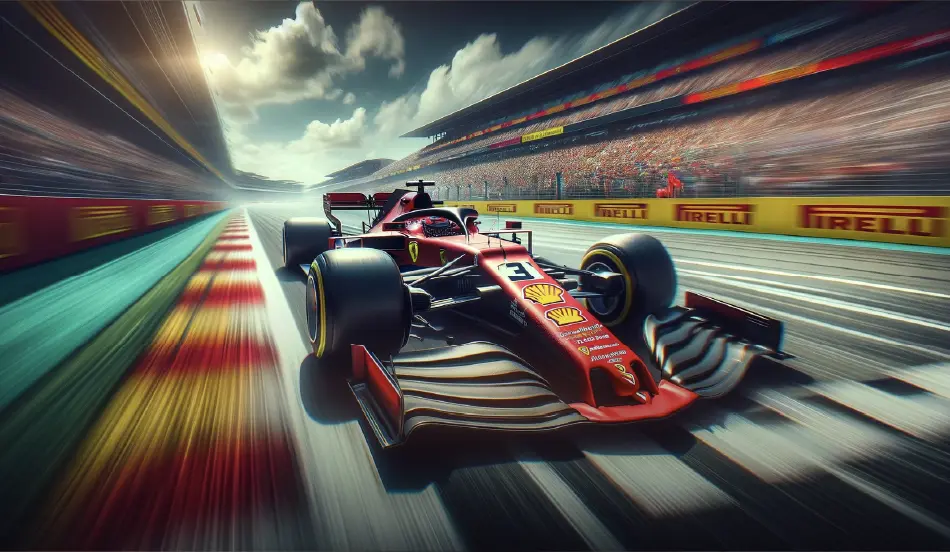The One Lesson from Schumacher Every Chess Player Should Take
Understanding this was a very important step for me in my journey to my Grandmaster title. I hope it will skyrocket your chess and life too.
Understanding this was a very important step for me in my journey to my Grandmaster title. I hope it will skyrocket your chess and life too.

I was pedaling my blue car in our yard as fast as I could.
Our neighbour stopped me:
“Kid, are you Schumacher? Go slower. There are lots of cars in our yard.”

It was something like this, a bit older 😊
I got confused and ran home.
“Daddy, who is Schumacher?”
“Do you know who is Michael Jordan, Mike Tyson, Garry Kasparov?”, he asked.
I nodded my head.
“Michael Schumacher is Michael Jordan, Mike Tyson, and Garry Kasparov in race car driving.”
I didn’t know what he looked like but from then on, whenever I was pedaling my car, I would imagine I was Schumacher.
***
I’m not sure if Netflix has recently started to add lots of good documentaries, or if they’ve improved their AI to suggest movies I am interested in one after another, or if my taste has just become better.
But for another Monday in a row (my only day off) I clicked on a great one! This time - about Michael Schumacher.

https://www.netflix.com/am/title/81399204
I paused the movie multiple times, thinking and taking notes. But the longest pause I took happened at the beginning of the movie.
Schumacher said:
“You have to become one with the car. You should know exactly how much stress you can give to the car.
Because there is always a limit, and you should be careful… like with everything in life… you have to have that kind of feeling to not go over the top of it or not be under it. And if you do that, then both of you will be satisfied. The car and you.”
While most of us don’t drive Formula 1 cars, we still have our own “car” that we should be one with - our brain!
It is important for everyone, but especially for you and me as chess players.
How many times were you playing online blitz and you just weren’t one with your car?
When you play online blitz and you’re not one with your “car”, you play your 50th game, blunder, lose, tilt, and your “car’s engine” screams at you, but you don’t listen to it, you keep playing, and when you finally stop, you find yourself 150 points lower than when you started that online session, not in the right mood, and you “car” is burning from the heat.
Sure, Nakamura can play 50 blitz games in a row, and everything will be fine with his car.
But you should know YOUR OWN CAR and be one with it.
GM Erigasi Arjun can play 5 tournaments in a row and the quality of his games will not decline. But it’s his car.
Your car might want a rest after the 1st tournament, or maximum two.

Many kids, and people younger than you, are very comfortably playing double-round tournaments. But it's their cars.
If you try to blindly copy what they do, you’ll completely crush your car, your results, and yourself.
***
Understanding my own car was a very important step for me in my journey to my Grandmaster title. I understood that my car is slower than that of my peers. It burns out faster. And it needs to be fixed more often.
So I stopped playing two tournaments in a row, avoided double-round tournaments, and mainly tried to play just 1 tournament a month. And then take a rest, repair, fix.
Knowing your own car, and understanding its capacity, will be one of the most important things you can do for your career.
Don’t compare yourself to what others do. No one has the same car as you.
To understand your car you have to listen to it.
Your chess/car will talk to you. It’ll say to you “Enough”, or “I can go a little bit more but not too much,” or “Let’s go!”
Just start learning to listen to it.
And if you ask if you can improve your car, the answer is - 100%!
If you watch the full movie, you’ll see how hard mechanics work on Shumacher’s Ferrari, and how Shumacher himself spends time with his mechanics to improve the car.
But at first, he drives the car, understands it, and only then tries to improve.
And so should you.
Practice, listen to your car, understand it, and try to improve it.
You can work on your physical health, chess stamina, your diet and sleep, etc… (Watch the ChessMood Podcast Episode with health and peak-performance expert Ben Greenfield here.)
And when you learn how much stress you can give to your car, then all of you will be satisfied. Your brain, your chess results, and you.
If you care about me, then yes, me too.
With best wishes and love,
For your growth and fun journey,
GM Avetik (or Avo as my friends call me)
Originally published Apr 2, 2024

